Intestinal microbiota metabolism of L-carnitine, a nutrient in red meat, promotes atherosclerosis
- PMID: 23563705
- PMCID: PMC3650111
- DOI: 10.1038/nm.3145
Intestinal microbiota metabolism of L-carnitine, a nutrient in red meat, promotes atherosclerosis
Abstract
Intestinal microbiota metabolism of choline and phosphatidylcholine produces trimethylamine (TMA), which is further metabolized to a proatherogenic species, trimethylamine-N-oxide (TMAO). We demonstrate here that metabolism by intestinal microbiota of dietary L-carnitine, a trimethylamine abundant in red meat, also produces TMAO and accelerates atherosclerosis in mice. Omnivorous human subjects produced more TMAO than did vegans or vegetarians following ingestion of L-carnitine through a microbiota-dependent mechanism. The presence of specific bacterial taxa in human feces was associated with both plasma TMAO concentration and dietary status. Plasma L-carnitine levels in subjects undergoing cardiac evaluation (n = 2,595) predicted increased risks for both prevalent cardiovascular disease (CVD) and incident major adverse cardiac events (myocardial infarction, stroke or death), but only among subjects with concurrently high TMAO levels. Chronic dietary L-carnitine supplementation in mice altered cecal microbial composition, markedly enhanced synthesis of TMA and TMAO, and increased atherosclerosis, but this did not occur if intestinal microbiota was concurrently suppressed. In mice with an intact intestinal microbiota, dietary supplementation with TMAO or either carnitine or choline reduced in vivo reverse cholesterol transport. Intestinal microbiota may thus contribute to the well-established link between high levels of red meat consumption and CVD risk.
Figures
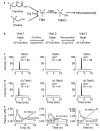
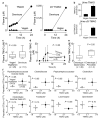
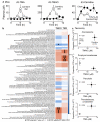
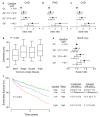
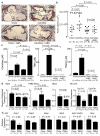
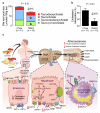
Comment in
-
Nutrition: Red meat consumption leads to a microbiota-dependent risk of cardiovascular disease.Nat Rev Endocrinol. 2013 Jul;9(7):378. doi: 10.1038/nrendo.2013.90. Epub 2013 Apr 23. Nat Rev Endocrinol. 2013. PMID: 23609335 No abstract available.
-
Meat-metabolizing bacteria in atherosclerosis.Nat Med. 2013 May;19(5):533-4. doi: 10.1038/nm.3178. Nat Med. 2013. PMID: 23652100 No abstract available.
-
Meat-loving microbes: do steak-eating bacteria promote atherosclerosis?Circ Cardiovasc Genet. 2013 Jun;6(3):308-9. doi: 10.1161/CIRCGENETICS.113.000213. Circ Cardiovasc Genet. 2013. PMID: 23778590 No abstract available.
-
L-carnitine consumption, its metabolism by intestinal microbiota, and cardiovascular health.Mayo Clin Proc. 2013 Aug;88(8):786-9. doi: 10.1016/j.mayocp.2013.06.004. Mayo Clin Proc. 2013. PMID: 23910406 No abstract available.
References
-
- Hansen ES. International Commission for Protection Against Environmental Mutagens and Carcinogens. ICPEMC Working Paper 7/1/2. Shared risk factors for cancer and atherosclerosis--a review of the epidemiological evidence. Mutat. Res. 1990;239:163–179. - PubMed
Publication types
MeSH terms
Substances
Grants and funding
- UL1 RR024989/RR/NCRR NIH HHS/United States
- P30-DK034987-25-28/DK/NIDDK NIH HHS/United States
- RC1 DK086472/DK/NIDDK NIH HHS/United States
- P20 HL113452/HL/NHLBI NIH HHS/United States
- 1RC1DK086472/DK/NIDDK NIH HHS/United States
- P40 RR018603/RR/NCRR NIH HHS/United States
- P01 HL098055/HL/NHLBI NIH HHS/United States
- P40-RR018603-06-08/RR/NCRR NIH HHS/United States
- P01 HL30568/HL/NHLBI NIH HHS/United States
- P01 H28481/PHS HHS/United States
- R00 HL096166/HL/NHLBI NIH HHS/United States
- T32 GM007250/GM/NIGMS NIH HHS/United States
- R01 CA127334/CA/NCI NIH HHS/United States
- UH3 DK083981/DK/NIDDK NIH HHS/United States
- R01 HL103931/HL/NHLBI NIH HHS/United States
- R01 HL103866/HL/NHLBI NIH HHS/United States
- P30 DK034987/DK/NIDDK NIH HHS/United States
- 1UL1RR024989/RR/NCRR NIH HHS/United States
- UH3-DK083981/DK/NIDDK NIH HHS/United States
- P01 HL028481/HL/NHLBI NIH HHS/United States
- P01 HL076491/HL/NHLBI NIH HHS/United States
- R01 HL098193/HL/NHLBI NIH HHS/United States
- P01 HL030568/HL/NHLBI NIH HHS/United States
LinkOut - more resources
Full Text Sources
Other Literature Sources
Medical
Molecular Biology Databases

